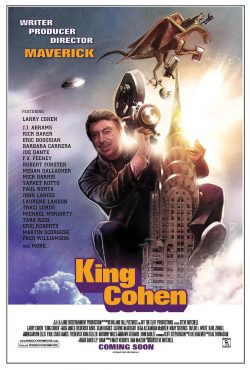 The annals of cult film history are littered with instantly recognisable names whose many illustrious works could be named at the drop of a hat by anyone with a reasonable knowledge of the material. However, there are plenty of other names who don’t have quite the same level of recognition, nor are any of their works quite so well known, but when you take a closer look at their CV it’s surprising to see just how enduring, prolific and influential they really were. Such is the case with Larry Cohen, a name that I for one have long been familiar with, yet without ever really having too great an awareness of his body of work. Like many horror fans, I knew of him primarily for It’s Alive, Q: The Winged Serpent and The Stuff, but as this documentary from director Steve Mitchell explores, there’s a whole lot more to Cohen’s career than those three horror hits.
The annals of cult film history are littered with instantly recognisable names whose many illustrious works could be named at the drop of a hat by anyone with a reasonable knowledge of the material. However, there are plenty of other names who don’t have quite the same level of recognition, nor are any of their works quite so well known, but when you take a closer look at their CV it’s surprising to see just how enduring, prolific and influential they really were. Such is the case with Larry Cohen, a name that I for one have long been familiar with, yet without ever really having too great an awareness of his body of work. Like many horror fans, I knew of him primarily for It’s Alive, Q: The Winged Serpent and The Stuff, but as this documentary from director Steve Mitchell explores, there’s a whole lot more to Cohen’s career than those three horror hits.
King Cohen’s story begins in a very different climate than the 70s exploitation arena on which Cohen’s legend was largely built. His first work was in television, where he worked solidly as a writer all through the 60s: on top of contributing scripts to a great many established shows, he also created a few, including The Invaders, Coronet Blue and Branded (which, as the doc notes, was immortalised for modern viewers by its references in The Big Lebowski). However, the film paints Cohen as something of a maverick, often at odds with the powers that be, and unwilling to stay bound to a single show for more than a few episodes for fear of getting bored. So it was that, following his directorial debut Bone (AKA Dial Rat) in 1972, Cohen carved his own niche in cinema as writer, director and producer of a slew of movies. His 1973 features Black Caesar and Hell Up In Harlem were among the first major blaxploitation titles which helped cement their star Fred Williamson as an icon of that genre; then 1974 saw him move into horror with It’s Alive, which remains a cult favourite. In the process, the film presents a compelling case for his having pioneered the ‘guerrilla filmmaking’ approach that future indie auteurs would follow: shooting from the hip in major locations without permits, staging often violent and dangerous scenes in full view of oblivious passers-by, and rushing from one project to the next. One particularly striking story tells how Cohen found himself fired from a movie in New York City, then proceeded to commence work on a new one mere days later, production on which caused panic after machine guns were fired around the Chrysler Building. The film in question was the aforementioned Q: The Winged Serpent, which wound up one of his best loved works; hence it’s the primary subject of King Cohen’s official poster, as you can see below.
 Naturally any documentary of this nature is going to go some way to romanticise its subject, with gushing praise for such illustrious peers as Martin Scorcese, John Landis and Joe Dante. There may be points where we feel Cohen’s significance to modern cinema is being overstated just a little, not least by Cohen himself, who proves the most entertaining interview subject of all. Still, the film doesn’t necessarily let him off scot-free on all counts when it comes to self-aggrandising; witness Cohen claiming to have made a deal with Fred Williamson, that any time he asked the actor to perform a stunt, he would first do the same stunt himself, which Williamson declares an outright lie. But hey, whether it’s true or not, it’s a fun story to hear, and it’s very hard not to feel some affection for the colourful raconteur recounting it.
Naturally any documentary of this nature is going to go some way to romanticise its subject, with gushing praise for such illustrious peers as Martin Scorcese, John Landis and Joe Dante. There may be points where we feel Cohen’s significance to modern cinema is being overstated just a little, not least by Cohen himself, who proves the most entertaining interview subject of all. Still, the film doesn’t necessarily let him off scot-free on all counts when it comes to self-aggrandising; witness Cohen claiming to have made a deal with Fred Williamson, that any time he asked the actor to perform a stunt, he would first do the same stunt himself, which Williamson declares an outright lie. But hey, whether it’s true or not, it’s a fun story to hear, and it’s very hard not to feel some affection for the colourful raconteur recounting it.
It’s possible some fans might feel a little short-changed given that the focus of the documentary is primarily Cohen’s directorial work, when he’s always been far more prolific as a writer: for instance, there’s barely a passing mention of the beloved Maniac Cop, which he wrote but didn’t direct. Even so, the focus on his directorial work does bring up some interesting details which might have slipped your attention beforehand, such as the fact that he was the writer-director on the final film of Bette Davis, Wicked Stepmother, but was forced to heavily rework the project on the fly when the terminally ill actress abruptly quit midway through production.
Cult film-based documentaries have had quite the boom in recent years, perhaps most notably with Mark Hartley’s Not Quite Hollywood, Machete Maidens Unleashed and Electric Boogaloo. Steven Mitchell (who, it should be noted, has some major cult credentials of his own, having many moons ago written Chopping Mall) has delivered a respectable addition to that arena of documentaries liable to leave viewers with a list of new must-see movies as long as your arm. Those who are already well-versed in Larry Cohen’s filmography are sure to have a ball, and everyone else is likely to become an instant fan.
King Cohen begins its US theatrical run in Los Angeles on July 20th, with other cities to follow.
